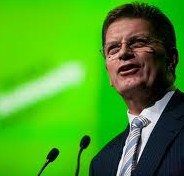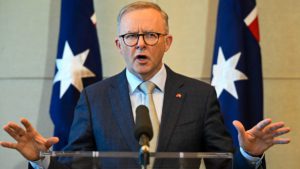Ted Baillieu is a Premier in trouble. Since coming to office, he has made a slew of unpopular decisions that have caused his public support to evaporate. Baillieu’s decision to scrap TAFE funding is perhaps the highest profile of these missteps. His anti-wind energy laws, imposed one year, are less well known but are a damaging sleeper issue.
The innocuous-sounding VC82 amendment effectively banned wind farms from operating in large swathes of the state. They establish arbitrary ‘no-go zones’ and allow just one objector to stop any wind turbine within 2km, making Victoria the world’s biggest NIMBY (Not In My Back Yard).
Our state’s once lucrative pipeline of wind farm projects has been blocked and capital is fleeing interstate. Over the last 12 months, just one development application has been lodged with the department of planning.
Traditionally, the Liberal Party was seen as the party of business and an ally of science and progress. In recent years, it has become captive to a Tea Party-style culture of anti-wind energy and anti-climate science extremism.
If the Premier was riding high in the polls then he could perhaps prosecute the irrational agenda of the anti-wind lobby. But he does not have political capital to spare on such ideological adventurism.
Unlike previous premiers, Kennett, Bracks and Brumby, who consolidated support during their first 18 months in office, Baillieu’s electoral support has fallen – and quite dramatically. As columnist Bruce Guthrie noted in the Sydney Morning Herald, “voter satisfaction [with Baillieu] has fallen from a healthy 52 per cent midway through last year to a stress-inducing 36 per cent less than 12 months later. …It’s the stuff of political nightmares,” Guthrie warns.
With such disastrous polling it’s no wonder, then, that Labor think they can make Baillieu a one-term Premier.
Over the next two years the Coalition and Labor party will battle for supremacy on economic management and jobs – issues that are typically the top priorities for voters. The fact his government’s anti-wind energy laws are bad for both must be causing Premier Baillieu sleepless nights.
To date, Baillieu’s anti-wind farm planning laws have cost around $887 million in lost or stalled investment; 650 direct jobs lost or stalled in construction; 54 on-going jobs in management of wind farms; and 1408 indirectly associated (flow-on) jobs. The flood of investment that has flowed to the South Australian wind energy sector since the introduction of VC82 confirms the adverse economic consequences of the policy.
When it comes to the politics of wind energy, Premier Baillieu has undoubtedly backed the wrong horse.
Seeking to galvanise the Coalition’s electoral support in the lead up to the 2010 state election, Baillieu adopted a clear anti-wind energy position in his election platform. The political calculation was that anti-wind campaign groups the Waubra Foundation and Landscape Guardians would help deliver votes to the Coalition.
When you look at the real electoral impact, it’s apparent that anti-wind energy lobby is all sizzle and no sausage. The swing against Labor in the seat of Rippon – which covers Victoria’s ‘wind belt’ and was the target area of an organised anti-wind energy campaign – was less than the state-wide trend. Anti-wind campaigners get excessive media coverage, but their stance is unscientific and electorally unpopular.
Polls here, in America and in the UK show that wind energy remains highly popular, despite anti-wind hysteria. Polls commissioned by the Climate Institute and the Clean Energy Council register majority support for wind energy at 75 per cent and greater. In the Clean Energy Council study, 60 per cent of those polled viewed restrictions on wind farms as a missed opportunity to support the manufacturing sector – a finding that reveals voters see a clear link between the wind energy sector and manufacturing jobs.
A credible CSIRO study on the perceptions of wind energy in regional areas concluded: ‘There is strong community support for the development of wind farms, including support from rural residents who do not seek media attention or political engagement to express their views.”
The anti-wind energy stance has the potential to harm the Baillieu government another way. The cost of electricity has quickly risen to the top of the issue agenda. Energy market observers are well aware of dampening effect wind energy has on wholesale electricity prices. The electricity now produced by South Australia’s wind farms prevents expensive fossil fuel generators dispatching electricity to the grid. Public discontent with the Baillieu government will grow as more people become aware of wind energy’s ability to keep a lid on electricity price rises.
Premier Baillieu is in a tight spot but has a way out. The VC82 laws are executive decisions and can be repealed as quickly as they were introduced.
The first step out of Tea Party extremism and back to core Liberal values, is for the Premier to exempt community-owned wind companies from these NIMBY regulations. That will show respect for enterprise, community and rational policy. It will win votes.
Will Premier Baillieu accept the realpolitik or back the anti-wind extremists? Time will tell. If he doesn’t it’ll be a gift for the Labor opposition. With thousands of jobs and billions in investment at stake, the party that supports restoring sensible planning guidelines for wind farms will have an electoral edge in 2014.
Leigh Ewbank is Friends of the Earth’s Yes To Renewables spokesperson









